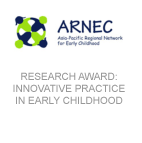Want to know what Nobel Prize Winner James Heckman thinks of President Obama’s plan to invest in early childhood? Here it is, and we couldn’t say it any better ourselves!
“Holy smokes!” That was Professor Heckman’s initial reaction when The Washington Post asked him to comment on President Obama’s proposed early childhood plan shortly after its announcement in the State of the Union address. Indeed, President Obama made history by making quality, birth-to-five early childhood development a national priority for reducing inequality, increasing achievement and building a stronger economy.
President Obama’s early childhood plan makes great sense. It starts from birth, incorporates health as an input and includes home visitation, the expansion of Early Head Start and quality improvements to Head Start and preschool. Most importantly, the President’s plan places a priority on providing low-income children and families with access to essential developmental services. Funding priorities have rightfully focused on children at or below 200% of poverty, and states are given latitude to subsidize middle class families on a sliding scale if funding is available.
We note, however, that much work must be done to bring the plan to life and, most importantly, to make sure it remains comprehensive and focused on disadvantaged families first. For example, the plan is being referred to as “universal pre-K,” when it is actually more thoughtful, efficient and exponentially impactful than simply providing universal preschool at ages three and four.
As the President, Congress and advocates grapple with turning a good idea into a better reality for America, it is critical that lawmakers understand which investments will have the greatest impact and when they will be most effective.
The facts are quite clear. Providing quality birth-to-five early childhood development for disadvantaged families is a highly effective tool for preventing the achievement gap and producing better education, health, social and economic outcomes. This will increase productivity and dramatically reduce the need for social spending. Unlike other social programs, there are no economic tradeoffs in equity, because equal access to effective skills development will result in greater economic output for individuals and the nation. Every dollar invested in quality early childhood development for disadvantaged children results in a 7-10 percent return per child, per year.Starting at birth is critically important for developing essential capabilities that are formed at the earliest ages and yield lasting returns for individuals and society. It is important to recognize that skill begets skill in a complementary way. Gaps in development open up early and are extremely difficult and expensive to close. Therefore, the earliest investments—including the promotion of maternal and prenatal health and education—are the most effective and cost-efficient because they help prevent gaps from emerging in the first place.
If properly implemented, President Obama’s early childhood plan will move America forward. We can better guarantee success if implementation is guided by a few simple but very important touchstones: focus on disadvantaged families, start at birth, include health and invest in quality from birth to age five.









